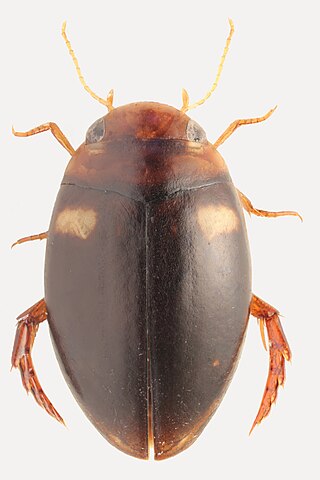Related Research Articles

The Dytiscidae – based on the Greek dytikos (δυτικός), "able to dive" – are the predaceous diving beetles, a family of water beetles. They occur in virtually any freshwater habitat around the world, but a few species live among leaf litter. The adults of most are between 1 and 2.5 cm (0.4–1.0 in) long, though much variation is seen between species. The European Dytiscus latissimus and Brazilian Megadytes ducalis are the largest, reaching up to 4.5 and 4.75 cm respectively. In contrast, the smallest is likely the Australian Limbodessus atypicali of subterranean waters, which only is about 0.9 mm (0.035 in) long. Most are dark brown, blackish, or dark olive in color with golden highlights in some subfamilies. The larvae are commonly known as water tigers due to their voracious appetite. They have short, but sharp mandibles and immediately upon biting, they deliver digestive enzymes into prey to suck their liquefied remains. The family includes more than 4,000 described species in numerous genera.

Agabus is a large genus of predatory aquatic beetles in the family Dytiscidae, proposed in 1817 by William Elford Leach and named after Agabus, an early follower of Christianity. The adult beetles are moderate-sized, 5 to 14 mm long. The genus is primarily Holarctic in distribution, with only a few species known from the Afrotropical and Neotropical realms. Three species of Agabus, namely A. clypealis, A. discicollis and A. hozgargantae are endangered according to the IUCN Red List. The division into subgenera is not widely accepted. However, a number of species groups are recognized after the works of David J. Larson and Anders N. Nilsson. The genus is probably polyphyletic or paraphyletic. In a recent study of mitochondrial DNA, Agabus was found paraphyletic with respect to several of the species groups of Platambus, a closely related genus in the tribe Agabini. Lately the taxonomy of the genus has been revised, and some groups of species were transferred from Agabussensu stricto to other genera in the tribe Agabini.
Copelatus andreinii is a species of diving beetle. It is part of the genus Copelatus in the subfamily Copelatinae of the family Dytiscidae. It was described by Régimbart in 1905.
Copelatus amazonicus is a species of diving beetle. It is part of the genus Copelatus in the subfamily Copelatinae of the family Dytiscidae. It was described by Régimbart in 1889.

Copelatus haemorrhoidalis is a species of diving beetle. It is part of the genus Copelatus in the subfamily Copelatinae of the family Dytiscidae. It was described by Régimbart in 1883.
Copelatus bottegoi is a species of diving beetle. It is part of the genus Copelatus in the subfamily Copelatinae of the family Dytiscidae. It was described by Régimbart in 1895.
Copelatus chloroticus is a species of diving beetle. It is part of the genus Copelatus in the subfamily Copelatinae of the family Dytiscidae. It was described by Régimbart in 1899.
Copelatus decemsulcatus is a species of diving beetle. It is part of the genus Copelatus of the subfamily Copelatinae in the family Dytiscidae. It was described by Régimbart in 1895.
Copelatus feae is a species of diving beetle. It is part of the genus Copelatus in the subfamily Copelatinae of the family Dytiscidae. It was described by Régimbart in 1888.
Copelatus griffinii is a species of diving beetle. It is part of the genus Copelatus in the subfamily Copelatinae of the family Dytiscidae. It was described by Régimbart in 1899.
Copelatus heterogynus is a species of diving beetle. It is part of the genus Copelatus in the subfamily Copelatinae of the family Dytiscidae. It was described by Régimbart in 1899.
Copelatus irinus is a species of diving beetle. It is part of the genus Copelatus in the subfamily Copelatinae of the family Dytiscidae. It was described by Régimbart in 1899.
Copelatus masculinus is a species of diving beetle. It is part of the genus Copelatus, which is in the subfamily Copelatinae of the family Dytiscidae. It was described by Régimbart in 1899.
Copelatus platynotus is a species of diving beetle. It is part of the genus Copelatus in the subfamily Copelatinae of the family Dytiscidae. It was described by Régimbart in 1895.
Copelatus sordidipennis is a species of diving beetle. It is part of the subfamily Copelatinae in the family Dytiscidae. It was described by Régimbart in 1895.
Copelatus ternatensis is a species of diving beetle. It is part of the subfamily Copelatinae in the family Dytiscidae. It was described by Régimbart, 1899.
Copelatus variegatus is a species of diving beetle. It is part of the subfamily Copelatinae in the family Dytiscidae. It was described by Régimbart in 1895.
Madaglymbus unguicularis is a species of diving beetle. It is part of the subfamily Copelatinae of the family Dytiscidae. It was described by Régimbart in 1903.
Copelatus vigintisulcatus is a species of diving beetle. It is part of the subfamily Copelatinae in the family Dytiscidae. It was described by Régimbart in 1895.

Laccophilinae is a subfamily of ground and water beetles in the family Dytiscidae. There are at least 410 described species in Laccophilinae.
References
- ↑ Dytiscidae Species List at Joel Hallan's Biology Catalog. Texas A&M University. Retrieved on 7 May 2012.